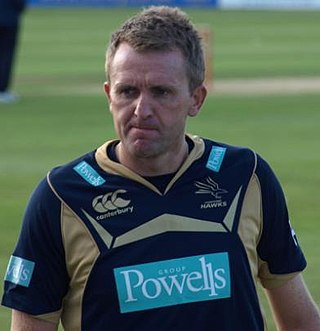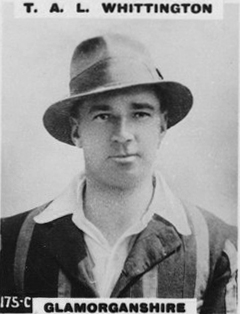Related Research Articles

Hampshire County Cricket Club is one of eighteen first-class county clubs within the domestic cricket structure of England and Wales. It represents the historic county of Hampshire. Hampshire teams formed by earlier organisations,principally the Hambledon Club,always had first-class status and the same applied to the county club when it was founded in 1863. Because of poor performances for several seasons until 1885,Hampshire then lost its status for nine seasons until it was invited into the County Championship in 1895,since when the team have played in every top-level domestic cricket competition in England. Hampshire originally played at the Antelope Ground,Southampton until 1885 when they relocated to the County Ground,Southampton until 2000,before moving to the purpose-built Rose Bowl in West End,which is in the Borough of Eastleigh. The club has twice won the County Championship,in the 1961 and 1973 seasons.

Dominic Gerald Cork is a former English county and international cricketer. Cork was a right-handed lower-order batsman who bowled right-arm fast-medium,and was renowned for his swing and seam control. In 1995,he took the best figures for an England bowler on Test debut,with 7 for 43 in the second innings against the West Indies.
John Harry Hampshire,also known as Jack Hampshire,was an English cricketer and umpire,who played eight Tests and three One Day Internationals (ODIs) for England between 1969 and 1975. He played first-class cricket for Yorkshire from 1961 to 1981,and for Derbyshire from 1982 to 1984. Overseas,he was a successful captain of Tasmania in the period before the state was included in the Sheffield Shield. He was also appointed President of Yorkshire County Cricket Club in 2016,serving until his death a year later.

Edward George Wynyard was an English sportsman and a career officer in the British Army. He was primarily known as a first-class cricketer who played at domestic level predominantly for Hampshire and the Marylebone Cricket Club (MCC),in addition to playing Test cricket for England on three occasions. He made over 150 appearances in first-class cricket between 1878 and 1912,as a batsman whom Wisden described as "a splendid forcing batsman". He scored over 8,300 runs and made thirteen centuries. He was an important figure in Hampshire's return to first-class status in 1894,and shortly after he was engaged as both captain and president of Hampshire. Wynyard would later serve on the committee of the MCC.
John Daniel Francis is an English former first-class cricketer who played county cricket at first-class level for Hampshire and Somerset as a batsman.
Michael Burns is an English first-class list cricket umpire and former first-class cricketer who played county cricket for Warwickshire and Somerset in a first-class career which spanned from 1992 until 2005. He also played Minor Counties cricket for Cumberland and Cornwall. An adaptable cricketer,he appeared for Cumberland and Warwickshire as a wicket-keeper,but when he moved to Somerset he developed into an aggressive batsman who bowled at medium-pace when needed.
Tony Charles Middleton is an English cricket coach and a former first-class cricketer. Middleton played for Hampshire from 1984 to 1995,making over 160 appearances across first-class and one-day cricket. Following his retirement in 1995,he has held a variety of coaching roles at Hampshire and as 2024 is the club's batting coach.

James 'Jimmy' Stone was an English first-class cricketer and umpire. A wicket-keeper,he played for Hampshire and Glamorgan between 1900 and 1923,making over 300 first-class appearances,in which he scored over 10,000 runs and claimed over 400 dismissals as a wicket-keeper. He later stood as an umpire in nearly 240 matches between 1912 and 1934.

Richard Henry Moore was an English first-class cricketer. Moore debuted as a 17-year-old for Hampshire County Cricket Club in 1931 and made nearly 130 appearances for the county during the 1930s. He was appointed Hampshire captain for 1936 and 1937,succeeding Geoffrey Lowndes. An opening batsman who passed 1,000 runs for the season on three occasions,his best innings of note came in 1937,when he scored 316 runs in a single day against Warwickshire at Bournemouth,which remains as of 2024 the highest individual first-class score for Hampshire. With business commitments taking up more of his time,he relinquished the captaincy to Cecil Paris in 1938,but continued to play for Hampshire less frequently before the start of the Second World War.
Arthur George Holt was an English sportsman of the 1930s and 1940s. He played professional football for Southampton as an inside-forward,making 206 appearances and scoring 46 goals. As a cricketer,he played first-class cricket for Hampshire,making 79 appearances and scoring nearly 3,000 runs. After retirement from playing both sports,he became a coach with Hampshire from 1949 to 1965,coaching the county to its first first County Championship win in 1961. He was also the proprietor of a successful sports shop in Southampton.

Edward Sainsbury was an English cricketer who represented,and captained,Somerset County Cricket Club in the late 19th century. During a 10-year first-class cricket career,he also represented Gloucestershire and the Marylebone Cricket Club (MCC).
Neil Thomas McCorkell was an English first-class cricketer. A successor as Hampshire wicket-keeper to George Brown,McCorkell made his debut in first-class cricket in 1932. He would play for Hampshire eitherside of the Second World War,with distinction as both a wicket-keeper and opening batsman. In 396 first-class matches,he scored over 16,000 runs and made 717 dismissals behind the stumps. He was Hampshire's most successful wicket-keeper until his records were surpassed by Bobby Parks. McCorkell never played Test cricket for England,largely due to the concurrent careers of the Kent wicket-keeping duo Les Ames and Godfrey Evans.
Edward Mark Sprot was a Scottish first-class cricketer and British Army officer. Following a seven year commission with the King's Shropshire Light Infantry,Sprot played first-class cricket for Hampshire from 1898 to 1914,captaining the county from 1903 to 1914. As a captain,Sprot was known for his dynamic and unusual tactics,which sought to gain positive results from matches. In all,Sprot made 270 appearances in first-class cricket,scoring over 12,000 runs and making thirteen centuries. He additionally took 55 wickets,alongside taking 228 catches in the field. His first-class career came to an end with the beginning of the First World War.
Cecil Gerard Alexander Paris was an amateur English first-class cricketer who played for Hampshire County Cricket Club eitherside of the Second World War,including as captain in 1938. Later in his life,he was a prominent cricket administrator. He was the first chairman of the Test and County Cricket Board and succeeded the Duke of Edinburgh as president of the Marylebone Cricket Club in 1975. He also held every administrative office at Hampshire until 1989. During the Second World War,Paris was a liaison officer for General Bernard Montgomery and was awarded the Czechoslovak War Cross. By profession,he was a solicitor and was a partner in his family's long-established Southampton law firm.

Henry Michael Barnard was an English first-class cricketer and professional footballer. As a cricketer,he represented Hampshire in 276 first-class matches and played an important part in helping Hampshire to win their first County Championship in 1961. As a predominantly middle order batsman,he scored over 9,000 runs for Hampshire. In football,he made 116 appearances in the Football League as an inside forward for Portsmouth,scoring 24 goals. He also played non-League football for Gosport Borough,Chelmsford City,and Poole Town.
Peter Barrett was an English first-class cricketer.
David John Rock is an English former first-class cricketer who played county cricket for Hampshire in the mid-to-late 1970s.
Richard Edward Hayward is a former English first-class cricketer. Hayward was a left-handed batsman who bowled left-arm medium pace.
Richard Arthur Carty was an English first-class cricketer.

Thomas Aubrey Leyson Whittington was a Welsh cricketer. Whittington was a right-handed batsman who fielded occasionally as a wicket-keeper. He was born in Neath,Glamorgan. In a career which lasted 22 years,Whittington was to prove a crucial figure in the history of Glamorgan County Cricket Club,with his influence within the MCC gaining them elevation from a Minor county to a first-class county and entry to the County Championship,a position they retain to this day.
References
- ↑ "Shrewsbury School – Schools Cricket Online". www.schoolscricketonline.co.uk. Retrieved 26 April 2020.
- 1 2 3 4 5 "A–Z (P4)". www.hampshirecrickethistory.wordpress.com. 9 April 2018. Retrieved 28 April 2024.
- 1 2 3 4 5 "First-Class Matches played by Nick Pocock" . CricketArchive. Retrieved 28 April 2024.
- ↑ "Hampshire v Leicestershire, County Championship 1976" . CricketArchive. Retrieved 28 April 2024.
- 1 2 3 "First-Class Batting and Fielding in Each Season by Nick Pocock" . CricketArchive. Retrieved 28 April 2024.
- 1 2 3 "List A Matches played by Nick Pocock" . CricketArchive. Retrieved 28 April 2024.
- ↑ "Cricket" . Aldershot News. 13 June 1978. p. 32. Retrieved 28 April 2024– via British Newspaper Archive.
- 1 2 3 4 Allen, Dave (15 December 2020). "Born On This Day: 15th December". www.utilitabowl.com. Retrieved 28 April 2024.
- ↑ "Hampshire v Middlesex, Schweppes County Championship 1979" . CricketArchive. Retrieved 28 April 2024.
- ↑ "Career-best Keith" . Daily Mirror . London. 11 May 1979. p. 30. Retrieved 28 April 2024– via British Newspaper Archive.
- ↑ "List A Batting and Fielding in Each Season by Nick Pocock" . CricketArchive. Retrieved 29 April 2024.
- ↑ Nicholas, Mark (2017). A Beautiful Game: My Love Affair with Cricket. London: Atlantic Books. p. 63. ISBN 9781952535314.
- ↑ "Cricket" . The People . London. 5 August 1984. p. 45. Retrieved 29 April 2024– via British Newspaper Archive.
- ↑ "Weekend cricket" . Reading Evening Post . 4 August 1984. p. 13. Retrieved 29 April 2024– via British Newspaper Archive.
- 1 2 "First-Class Batting and Fielding For Each Team by Nick Pocock" . CricketArchive. Retrieved 29 April 2024.
- ↑ "Hampshire v Lancashire, Schweppes County Championship 1982" . CricketArchive. Retrieved 29 April 2024.
- ↑ "List A Batting and Fielding For Each Team by Nick Pocock" . CricketArchive. Retrieved 29 April 2024.
- ↑ "The Hampshire Cricket Society" (PDF). www.hantscricsoc.org.uk. December 2011. Retrieved 29 April 2024.
- ↑ "Aberdeen punters give Craig's boys their backing" . Aberdeen Evening Express . 12 June 1998. p. 93. Retrieved 29 April 2024– via British Newspaper Archive.
- ↑ "Through the eyes of three great Old Salopians". www.shrewsbury.org.uk. Archived from the original on 17 May 2022. Retrieved 18 May 2022.
- ↑ Samuel, Juliet (19 March 2013). "City Diary: better than a six over the pavilion" . The Times . London. Retrieved 29 April 2024.
- ↑ "New Cricketer Cup President". www.thecricketercup.com. 18 November 2020. Retrieved 29 April 2024.